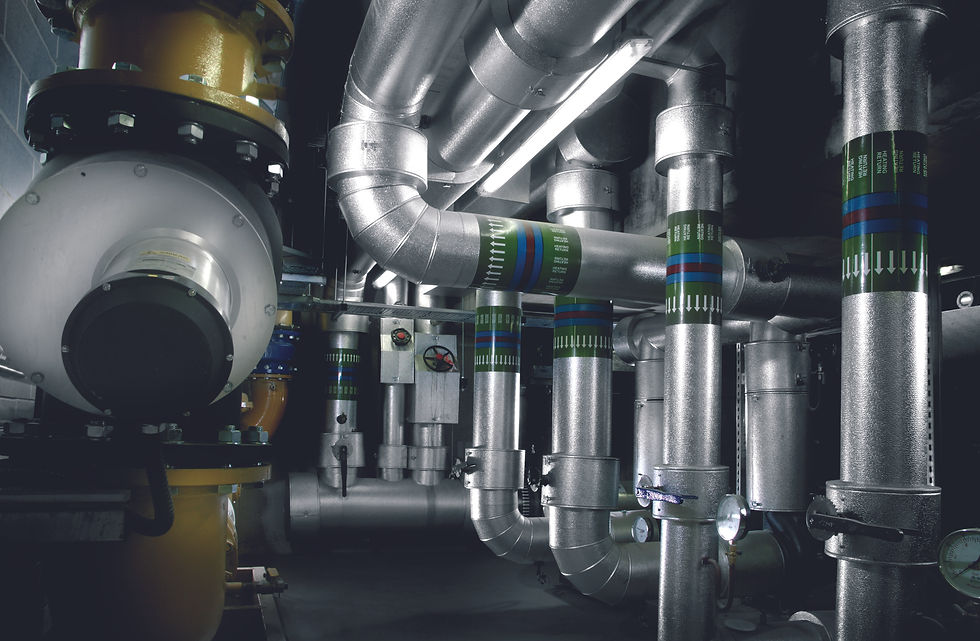Veolia launches low carbon heat network ‘Ecothermal Grid’ offer in the UK with £1 billion project pipeline
- Susan
- Nov 25, 2025
- 3 min read
Veolia has announced it has a £1 billion pipeline of projects that are due to be awarded by 2030, as part of the UK deployment of a new ‘Ecothermal Grid’ offering in the UK. It is in line with the company's ambitions to grow its district heating presence further in the UK, using a mix of different sources of energy to deliver carbon neutral heating and cooling.
Currently in the UK heat in buildings (heating up space, industrial heating and providing hot water) makes up over a third (37%) of the UK's CO2 emissions and with the government’s ambitious need to reduce carbon, innovative and green solutions to heat homes are critical.

As of 2024, only around 3% of UK heat demand is met by district heating networks, however the government target is for this to reach 20% by the year 2050 to support national decarbonisation goals. With this target set, the UK’s need for new district heating projects has never been stronger and the potential market value for district heating networks in the country is around £80 billion.
Veolia is now calling for the UK government to back a new wave of district heating and implement policies which it believes will benefit the market for low carbon heating.
To respond to growing demand, Veolia is actively working on a project pipeline to be awarded by 2030 with a total value of £1 billon for the group, across the UK including Wiltshire, London, Bristol, Yorkshire and Cambridgeshire. This pipeline includes £210 million of 2025 project wins already awarded in the UK.
In recent developments, Veolia has:
Completed Phase One of its ‘Southwark 2.0’ District Heat Network (DHN) in south London.
An extension to a DHN which currently provides over 2500 homes with secure and sustainable long term heat, which already saves around 8000 tonnes of CO² every year. Once finished, he DHN will supply nearly 7000 homes in the capital with ‘excess heat’, generated from the ‘energy from waste’ plant that Veolia operates in Southwark, saving an additional 14,000 tonnes of CO² every year.
Phase Two of the Southwark 2.0 project is due to begin in March 2026 subject to regulatory approvals and will see a further expansion of the DHN.
Been selected by Wellcome Genome Campus as its preferred partner to design and build a fifth generation heating and cooling network, which will recover geothermal heat, alongside waste heat from a data centre facility.
The Wellcome Genome Campus is expanding its campus in Cambridgeshire from 125 to 440 acres to deliver a global destination for world leading institutes, businesses and talent in genomics, biodata, health data and data science.
This immense potential growth is why Veolia is driving investment into this sector as well as working closely with the UK government to push to implement policies which it believes will benefit the market, the environment and the consumer.
Policy changes needed now include:
Support for Heat Networks through the UK Emissions Trading Scheme (ETS): Energy from Waste facilities should be incentivised to supply local networks through ETS allowance liability reductions for providing heat to communities, encouraging cleaner heat.
Long term funding post Green Heat Network Fund: Longer term funding mechanisms beyond existing grants need to be developed, so heat network projects continue to boom in the UK and can continue to provide cheap, low carbon heat to consumers.
Mandation of the use of ‘waste heat’ from buildings on heat networks: New – and certain existing – buildings should be obligated to connect to and actually use local heat networks, ensuring stable demand for these systems once built.

Estelle Brachlianoff, chief executive officer, Veolia, said: ‘Veolia’s ambition is to be at the forefront of a new wave of heating networks across Europe, and ultimately to become the number one player in urban heating in Europe. In so doing, we will deliver a direct route to carbon neutral heating and cooling, using a diverse range of energy sources and integrating AI driven smart controls and energy storage technologies to create the most reliable and flexible networks. In order for this to happen, we need – across Europe and in the UK – funding mechanisms that provide certainty, and stable regulatory frameworks.’
Gavin Graveson, senior executive vice president, Northern Europe Zone, Veolia, said: ‘Veolia is investing heavily in new and existing heating networks. To encourage further investment in decarbonised heat in line with its 2050 targets, the government could use the UK Emissions Trading System (ETS) to incentivise electricity producers to supply local heating networks. Once the infrastructure is in place, the networks must also be fully utilised to optimise their profitability and carbon efficiency. Mandatory connections would guarantee operators’ stable demand.’






Comments